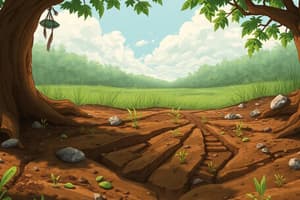Podcast
Questions and Answers
What was observed when the number indicating the greatest depth on the map was compared to the line of greatest length and breadth?
What was observed when the number indicating the greatest depth on the map was compared to the line of greatest length and breadth?
- They were parallel to each other.
- They intersected at the point of greatest depth. (correct)
- The line of greatest length was longer than the line of greatest breadth.
- The line of greatest breadth was longer than the line of greatest length.
What did the author consider due to the irregular outline of the pond despite the remarkable coincidence observed?
What did the author consider due to the irregular outline of the pond despite the remarkable coincidence observed?
- Reflecting on the significance of the coves in determining water depth.
- Conducting a similar mapping exercise for an ocean.
- Questioning if the same rule applied to mountains and valleys. (correct)
- Exploring the possibility of reaching the deepest part of a puddle.
What was observed in three out of five coves that were sounded?
What was observed in three out of five coves that were sounded?
- Wider mouths with shallower water over the bar.
- A bar quite across their mouths and deeper water within. (correct)
- Shallow water and no bars at their mouths.
- The absence of a basin or independent pond.
Why did the bay form a basin or independent pond within the land?
Why did the bay form a basin or independent pond within the land?
Why is it mentioned that every harbor on the sea-coast has its bar at its entrance?
Why is it mentioned that every harbor on the sea-coast has its bar at its entrance?
How did the width of the mouth of a cove influence water depth over the bar?
How did the width of the mouth of a cove influence water depth over the bar?
What did the author do to estimate the deepest point in White Pond?
What did the author do to estimate the deepest point in White Pond?
Why did the author mention that a stream running through or an island in the pond would complicate the problem?
Why did the author mention that a stream running through or an island in the pond would complicate the problem?
Why is the harmony resulting from seemingly conflicting laws more wonderful?
Why is the harmony resulting from seemingly conflicting laws more wonderful?
In what way do our notions of law and harmony differ, according to the text?
In what way do our notions of law and harmony differ, according to the text?
How did the author describe the mountain outline to illustrate different points of view?
How did the author describe the mountain outline to illustrate different points of view?
Why does the author mention that even when cleft or bored through, the mountain is not comprehended in its entirety?
Why does the author mention that even when cleft or bored through, the mountain is not comprehended in its entirety?
Flashcards are hidden until you start studying




